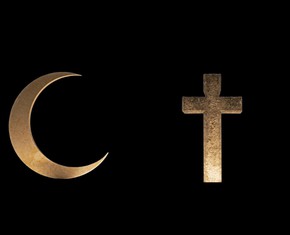The views expressed in our content reflect individual perspectives and do not represent the authoritative views of the Baha'i Faith.
Those who convert from one religion to another are usually assumed to have turned away from their former faith – but it was a completely different story for me.
At a particularly symbolic moment in my life, family and friends sat in a circle of chairs in our living room, a small booklet with devotional texts on their laps. There was a table in the middle with a completed card and two lit candles on it. This image has stayed with me since I declared myself a Baha’i, and will stay with me forever.
At its core, becoming a Baha’i consists of two elements: the inner conviction that Baha’u’llah – the prophet and founder of the Baha’i Faith – is the messenger of God for our age; and declaring that you want to be a member of the Baha’i community. The candles and the devotion were my own idea, because in the Baha’i religion there is no ritual for joining. You can do it freely or just declare it in writing.
RELATED: Why We Call the Prophets by Different Names
This Baha’i devotional, to which I had invited friends and family on the occasion of my declaration as a Baha’i, was not meant to be just any meeting, but also a confession: to Baha’u’llah, and to Jesus Christ. The candles were intended to make this clear. One of them was my Confirmation candle, which I had lit in church at the age of 13 out of conviction. The other was a self-made “declaration candle.”
At the beginning of the devotional, I first lit the Confirmation candle. Only towards the middle, after I had signed the Baha’i declaration card, did I light my “declaration candle” with the flame of the confirmation candle, so they both burned in parallel for the rest of the devotional. For me, that was indeed the decisive moment and the candles acted as a fitting symbol of my belief in both Christ and Baha’u’llah.
It was not about replacing Jesus with Baha’u’llah; nor was it about having Jesus be surpassed by Baha’u’llah. For without my faith in Jesus Christ, I could not have become a Baha’i. To renounce Jesus would never have been an option for me, and so the two burning candles at that moment expressed what my faith as a Baha’i is at its core. As Abdu’l-Baha, Baha’u’llah’s son and successor said in Lady Blomfield’s book The Chosen Highway: “If we accept the light of one of the lamps, we must believe in the light of all the lamps.”
In fact, even during my Confirmation, I asked myself what criteria I should use as a Christian to exclude the possibility that God might have communicated to humanity in ways other than through Jesus and the prophets of Israel. To answer that question, I studied Islam intensively for some time, read the Qur’an and recognized many parallels from the Bible.
I read about mercy, love of one’s neighbor, a forgiving God and his love for the people to whom He repeatedly reached out His hand. If, as a Christian, I was to judge according to the principle from Matthew 7:16 that “By their fruits you shall know them,” then for me the verdict was obvious: there was nothing I could hold against Muhammad’s divine claim.
But what made me shy away from actually joining Islam? It was the vehemence with which some Muslims emphasized that the Christian understanding of the person of Jesus was fundamentally wrong and, moreover, that the Bible was a forgery invented by priests who wanted to secure their power. I was also put off by the claim of absoluteness that Muslim clerics made for Muhammad, and to which Jesus was to be completely subordinated. No, abandoning my Christian faith in order to follow the ideas of the Muslim clergy was out of the question for me, because in them I could no longer recognize much of what had appealed to me about Muhammad’s words in the Qur’an. The fruits that the Christian faith had borne over the centuries were too sweet for me to consider it wrong.
When I became acquainted with the Baha’i Faith, and in the first instance came across texts that dealt very intensively and profoundly with Jesus Christ and the teachings of Christianity, it felt completely different. At no time did I have the impression that Baha’u’llah, Abdu’l-Baha or Shoghi Effendi, the Guardian of the Baha’i Faith, wanted to discredit or diminish my belief in Jesus.
RELATED: He Died for the Sins of the World
On the contrary, what I read testified to such a sincere love, such a deep understanding of what Jesus had taught, and such a clear view of the essential Christian principles that I could not help but feel strengthened in my Christian faith as a result.
Even when it came to topics which I myself found difficult – the Trinity, death on the cross or resurrection – the Baha’i writings finally gave me conciliatory answers and rational explanations. My experience was very much in line with what Shoghi Effendi had once formulated in his book The World Order of Baha’u’llah as a claim for the Baha’i Faith based on the unity of all Faiths:
The Revelation, of which Baha’u’llah is the source and center, abrogates none of the religions that have preceded it, nor does it attempt, in the slightest degree, to distort their features or to belittle their value. It disclaims any intention of dwarfing any of the Prophets of the past, or of whittling down the eternal verity of their teachings. It can, in no wise, conflict with the spirit that animates their claims, nor does it seek to undermine the basis of any man’s allegiance to their cause. Its declared, its primary purpose is to enable every adherent of these Faiths to obtain a fuller understanding of the religion with which he stands identified, and to acquire a clearer apprehension of its purpose. It is neither eclectic in the presentation of its truths, nor arrogant in the affirmation of its claims. Its teachings revolve around the fundamental principle that religious truth is not absolute but relative, that Divine Revelation is progressive, not final. Unequivocally and without the least reservation it proclaims all established religions to be divine in origin, identical in their aims, complementary in their functions, continuous in their purpose, indispensable in their value to mankind.”
But isn’t it actually absurd, I asked myself, that the founder of another religion should encourage me so much in my belief in the revealer of my previous religion? After all, his main purpose should be to convince me of the truth of his teachings in the first place, right?
So I continued to read the Baha’i scriptures and slowly got closer and closer to the real core. I learned that it could not be a matter of playing the religions off against each other, but of seeing them in the right relationship, so that they could complement each other and make me perceive their continuous purpose. This became particularly noticeable to me when reading in Baha’u’llah’s writings about concrete ideas on how the state of this world could be improved.
For Baha’u’llah, it was my impression, it was not enough for people to busy themselves exclusively with their own ideas; we also needed structures for society that could guarantee that what had been achieved would not be lost again right away. A clear compass and a clear vision of a socially and politically united humanity were needed. I had not found such a concrete and detailed idea of how the new world should be built in the New Testament – and that is precisely where the Baha’i teachings come in. That is also where Baha’u’llah’s claim begins. In his book The Promised Day Is Come, Shoghi Effendi wrote:
The Revelation associated with the Faith of Jesus Christ focused attention primarily on the redemption of the individual and the molding of his conduct, and stressed, as its central theme, the necessity of inculcating a high standard of morality and discipline into man, as the fundamental unit in human society. Nowhere in the Gospels do we find any reference to the unity of nations or the unification of mankind as a whole. When Jesus spoke to those around Him, He addressed them primarily as individuals rather than as component parts of one universal, indivisible entity. The whole surface of the earth was as yet unexplored, and the organization of all its peoples and nations as one unit could, consequently, not be envisaged, how much less proclaimed or established. What other interpretation can be given to these words, addressed specifically by Baha’u’llah to the followers of the Gospel, in which the fundamental distinction between the Mission of Jesus Christ, concerning primarily the individual, and His own Message, directed more particularly to mankind as a whole, has been definitely established.
Verily, He [Jesus] said: ‘Come ye after Me, and I will make you to become fishers of men.’ In this day, however, We say: ‘Come ye after Me, that We may make you to become the quickeners of mankind.’
My faith in Jesus Christ has not lost anything through my faith in Baha’u’llah. I didn’t have to give Christ up, I didn’t have to prune my beliefs, and I didn’t have to subordinate them either. On the contrary, I am more at peace with central beliefs of Christianity today than I was before my Baha’i declaration. My understanding has deepened, and I have gained enormously, not only a new perspective on the scriptures and teachings of my original faith, but also on what becomes possible when the messengers of God are not played off against each other, not placed in competition with each other, but perceived in their relationship to each other. In London in 1911, Abdu’l-Baha said:
The teachings are the same. It is the same foundation and the same temple. Truth is one, and without division. The teachings of Jesus are in a concentrated form. Men do not agree to this day as to the meaning of many of His sayings. His teachings are as a flower in the bud. Today, the bud is unfolding into a flower! Baha’u’llah has expanded and fulfilled the teachings, and has applied them in detail to the whole world.
My faith has thus gained a long-term perspective. The Christian faith is never finished or final, I’ve realized, it must develop, must be continued and thought through further. For me, Baha’u’llah is the logical next step, the successor of Jesus, who consistently continues on his path and takes me along as his follower with everything that makes me who I am. I could not wish for more in my faith.
Original version of this article on Perspektivenwechsel-Blog.
You May Also Like
Comments

















Ironically, my husband, who was an agnostic or atheist, depending on when you asked, became a Baha'i about a year after we married. ...He likes to say that Christ proved Baha'u'llah to him, while Christ proved Baha'u'llah.
All that to say, your story resonates very strongly with me.